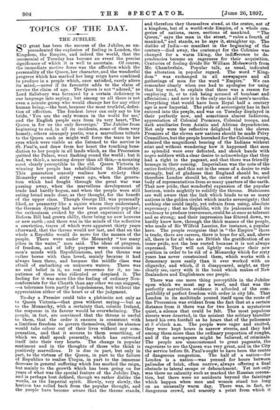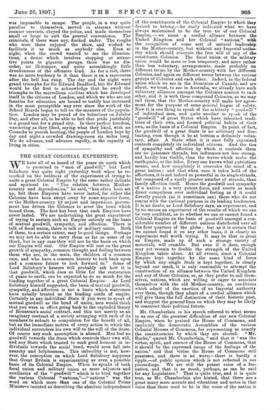TOPICS OF THE DAY.
THE JUBILEE.
So great has been the success of the Jubilee, so un- precedented the explosion of feeling in London, the Kingdom, the Empire, and indeed the world, that the ceremonial of Tuesday has become an event the precise significance of which it is well to ascertain. Of course, the immediate motive force was the affection which the personality of the Queen, her character, and the wonderful progress which has marked her long reign have combined to produce in a people which, once satisfied, rarely alters its mind,—never if its favourite adds to the claim of service the claim of age. The Queen is not "adored," as Lord Salisbury was betrayed by a certain deficiency in our language into saying ; but among us all there is not even a minute group who would change her for any other human being,—the best, because the most truthful, defini- tion of affection. The fondest lover can only say to his bride, You are the only woman in the world for me,' and the English people says from its very heart, The Queen is for us the only Sovereign.' The Jubilee from beginning to end, in all its incidents, some of them very homely, others strangely poetic, was a marvellous tribute to the Queen such as might well force the tears to her eyes which were visible as she listened to the service in St. Paul's, and draw from her heart the touching bene- diction to her people in all lands which, as the Procession quitted the Palace, went flashing round the world; but it had, we think, a meaning deeper than all this,—a meaning most dearly perceptible to the old. Queen Victoria in winning her people has rehabilitated the Monarchy. This generation scarcely realises how rickety that Monarchy seemed sixty years ago, when the genera- tion which had fought through the great war was passing away, when the marvellous development of trade had hardly begun, and when the people were still eating bread made dear, as they thought, for the benefit of the upper class. Though George III, was personally liked, as peasantry like a squire whom they understand, the German dynasty had never been genuinely popular ; the enthusiasm evoked by the great experiment of the Reform Bill had grown chilly, there being no new heavens or new earth ; and there was in the minds of the reflective a conviction, traces of which were apparent thirty years afterward, that the throne would not last, and that on the whole a Republic would do more for the masses of the people. There were under the Monarchy "too many pikes in the water," men said. The ideas of progress, of freedom, and of lofty purpose were connected in men's minds with Republicanism, and the throne was rather borne with than loved, mainly because it had always been there, and because the middle class was afraid of embarking on unknown waters. There was no real belief in it, no real reverence for it, no im- patience of those who ridiculed or despised it. The feeling for it was more like the feeling of ordinary Non- conformists for the Chureh than any other we can suggest, —a tolerance born partly of hopelessness, but without the appreciation either of the heart or of the judgment.
To-day a Premier could take a plebiscite not only as to Queen Victoria—that goes without saying—but as to the Monarchy, with a certainty that, outside Ireland, the response in its favour would be overwhelming. The people, in fact, are convinced that the throne is useful to them, that the order it ensures is consistent with a limitless freedom to govern themselves, that its absence would take colour out of their lives without any com- pensation, and that it secures to them something, of which we shall speak presently, which has entwined itself into their very hearts. The change in popular sentiment and in the thoughts of those who think is positively marvellous. It is due in part, but only in part, to the virtues of the Queen, in part to the failure of Republics to realise Utopia, in part to the immense decrease in general suffering which has marked the reign, but mainly to the growth which has been going on for years of what was the special feature of the Jubilee Day, and is perhaps best defined, though we rather dislike the words, as the Imperial spirit. Slowly, very slowly, the horizon has rolled back from the popular thought, and the people have become aware that the throne stands, and therefore they themselves stand, at the centre, not of a kingdom, but of a world-wide Empire, of a whole con- geries of nations, races, sections of mankind. " The- Queen," says the man in the street, "rules a fourth of mankind," and stands, as he says it, straighter up. The dislike of India—so manifest in the beginning of the century—died away, the contempt for the Colonies was: changed for a warm liking, the indifference to de- pendencies became an eagerness for their acquisition. Centuries of feeling divide Sir William Molesworth from Mr. Chamberlain. Popular talk, as usual, indicated the alteration in popular regard. The word " King- dom " was exchanged in all newspapers and all gatherings of men for the word "Empire." We can remember clearly when one had to apologise for using that big word, to explain that there was a reason for employing it, or to risk being accused of bombast and.4 affectation ; and now it is the only one in all men's mouths. Everything that would have been Royal half a century ago is now Imperial. The pride of sovereignty has in fact entered into the people, and was on Tuesday displayed in their perfectly new, and sometimes almost ludicrous, appreciation of Colonial Premiers, Colonial troops, and dark auxiliaries from Asiatic and African dependencies_ Not only were the reflective delighted that the eleven Premiers of the eleven new nations should be made Privy Councillors, but the people hurrahed for the Colonial troops„ admired the magnificent bearing of the Indians without stint and without wondering how it happened that men so splendid were ever defeated, and shook hands with negro soldiers with a clear desire to acknowledge that they had a right in the pageant, and that there was friendly homage in their coming. Imperialism was the note of the. entire festivity, and this not in the sense of a desire to rule• strongly, but of gladness that England should be, and therefore London should be, the centre of such a varied' body of representatives from so many quarters of the earth. That new pride, that wonderful expansion of the popular horizon, tends mightily to solidify the throne. Statesmen are well aware that the link which binds to us so many nations is the golden circlet which marks sovereignty; that nothing else could imply, yet refrain from using, absolute supremacy ; that no Republic, with its jealousies and its tendency to produce irreverence, could be at once so tolerant and so strong; and their impression has filtered down, we hardly know how, through the thick masses of the people,. who made of Sir Wilfrid Laurier, for instance, a popular hero. The people recognise that in "the Empire" there is trade, there are careers, there is hope for all, and, above all, there is for all who are British the gratification of an. inner pride, not the less rooted because it is not always. expressed. They will not lightly endanger their new position in order to be rid, of a Monarchy which for sixty years has never constrained them, which works with a democracy more easily than it ever worked with an oligarchy, and which, if it disappeared, might, as they clearly see, carry with it the bond which makes of New Zealanders and Englishmen one people.
There was one more thing perceptible in the Jubilee upon which we must say a word, and that was the- perfectly marvellous evidence it afforded of the com- patibility of perfect freedom with order in city life. That London in its multitude poured itself upon the route of the Procession was evident from the fact that at a certain distance from it there was for two hours a mysterious quiet, a silence that could be felt. The most populous streets were deserted, in the noisiest the solitary traveller heard his own footfall as he hears that of the policeman at 3 o'clock a.m. The people were eager and excited, they were kept hours in narrow streets, and they had among them more than the ordinary proportion of roughs, and if the newspapers might be believed, of criminals.- The people are unaccustomed to great pageants, the eagerness to see the Queen was very great, and in the City the service before St. Paul's ought to have been the centre of dangerous congestion. The half of a nation—for London is a nation—was penned for hours between palisades of brick, often narrow, always offering a final obstacle to lateral escape or debouchment. Yet not only was there no calamity such as marked the Russian corona- tion, but there were no accidents beyond the famtings which happen when men and women stand too long on an unusually warm day. There was, in fact, no dangerous crowd, and scarcely a point from which it Nem impossible to escape. The people, in a way quite peculiar to themselves, moved in streams without counter currents, obeyed the police, and made themselves small or large to suit the general convenience. The criminals, if there were any, ducked under. The roughs who were there enjoyed the show, and, wished to facilitate it as much as anybody else. Even at night, when the crowd wanted to see the illumina- tions, a desire which involves stopping at attrac- tive points in gigantic groups, there was no dis- order, no ill-temper, and quite astonishingly little drunkenness of the offensive kind. As for a riot, there was no more tendency to it than there is on a racecourse after the bell has rung. The day and. the night were grand triumphs for Sir Edward Bradford, but Sir Edward would be the first to acknowledge that he owed the triumphs to the marvellous civilitas which has developed itself in the citizens of London, and. which we who are not fanatics for education are bound to testify has increased in the most perceptible way ever since the work of the School Boards began to tell on the manners of the popula- tion. London may be proud of its behaviour on Jubilee Day, and after all, to be able to feel that pride justifiably is a grand test for a grand. city. In their perfect freedom, wandering as they liked, saying what they liked, with no Cossacks to punish hooting, the people of London kept by day and night a crowded drawing-room six miles long. We do advance, and advance rapidly, in the capacity of living in cities.



















































 Previous page
Previous page